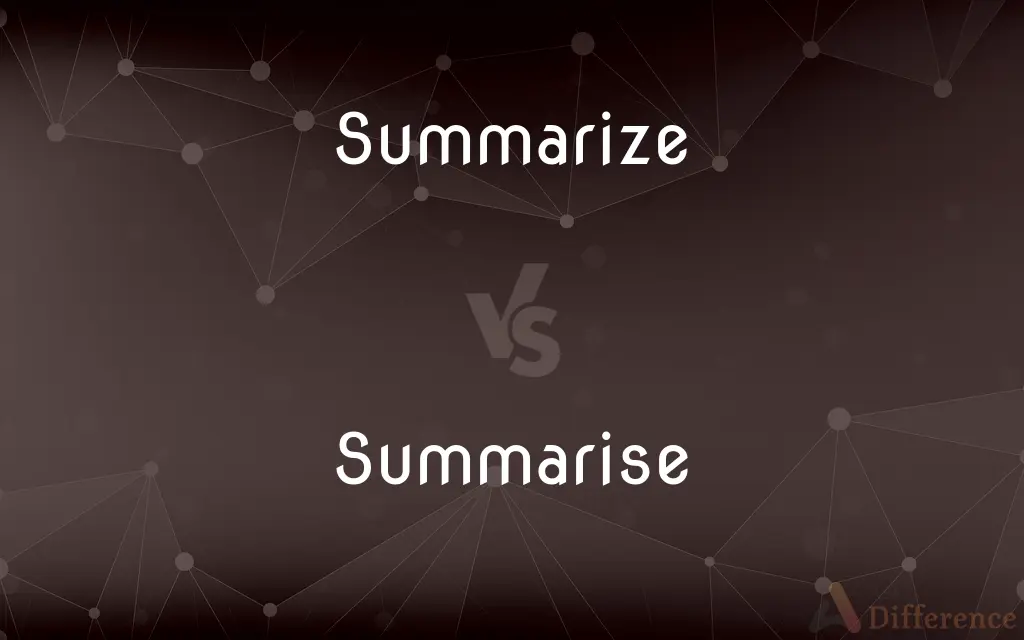Summarize vs. Summarise — What's the Difference?
By Maham Liaqat & Fiza Rafique — Updated on March 6, 2024
"Summarize" is the American English spelling, focusing on condensing content, whereas "summarise" is the British English variant, serving the same purpose of creating a brief overview.

Difference Between Summarize and Summarise
Table of Contents
ADVERTISEMENT
Key Differences
"Summarize" is commonly used in American English to describe the process of making a brief statement of the main points of something. It involves condensing a longer piece of text into a shorter version, highlighting the key points. On the other hand, "summarise" serves the same function but adheres to British English spelling conventions. Both terms indicate the act of distilling information to its essentials but differ primarily in their geographical usage.
In academic writing, "summarize" is preferred in institutions and publications following American English guidelines. This involves students and professionals condensing study materials, articles, or reports to grasp the core message. Whereas in the UK and countries following British English, "summarise" is the norm. Despite the spelling differences, the objective remains the same: to create a concise version of a longer document.
The usage of "summarize" versus "summarise" extends to digital tools and software. American-based software and applications tend to use the American spelling in their interfaces and documentation. Conversely, software developed in the UK or for British audiences might use "summarise." This reflects the broader linguistic preferences of the respective audiences, although the functionality related to text summarization remains unchanged.
When it comes to teaching English as a second language, the choice between "summarize" and "summarise" might depend on the curriculum's alignment with either American or British English standards. While learners are taught the process of summarizing texts, the spelling they are encouraged to use will align with the version of English being taught.
In the context of search engines and online resources, typing "summarize" might yield results that lean towards American sources, while searching for "summarise" could pull up British or Commonwealth websites. This distinction, while subtle, highlights the global reach of English and the importance of understanding these variations for effective communication across different English-speaking regions.
ADVERTISEMENT
Comparison Chart
Spelling
-ize at the end
-ise at the end
Usage
Preferred in American English
Preferred in British English
Academic Writing
Used in American educational institutions
Used in UK educational institutions
Digital Tools
American software uses "summarize"
British software uses "summarise"
Language Teaching
Taught in American English curriculums
Taught in British English curriculums
Compare with Definitions
Summarize
To make a brief statement of the main points of (something).
He summarized the arguments effectively.
Summarise
To present a summary.
Can you summarise what was discussed?
Summarize
To encapsulate the essence of a discussion.
She summarized the meeting's outcomes succinctly.
Summarise
To distill the core aspects of a discussion.
Summarising the text makes it easier to study.
Summarize
To condense a longer text into a short version.
The software summarizes lengthy articles.
Summarise
To make a concise version of something's main points.
He will summarise the key points of the lecture.
Summarize
To provide a summary.
The teacher asked us to summarize the chapter in one paragraph.
Summarise
To reduce a text to its essentials.
The application summarises news articles for quick reading.
Summarize
To abstract the key elements of a piece of writing.
Summarizing the report helped us focus on the main findings.
Summarise
To encapsulate the main arguments or points.
She summarised the novel's plot for the class.
Summarize
To make a summary or make a summary of.
Summarise
(British spelling) summarize.
Summarize
Give a summary (of);
He summed up his results
I will now summarize
Summarise
Be a summary of;
The abstract summarizes the main ideas in the paper
Summarize
"Summarize" is the first single released from Australian indie rock band Little Birdy's third studio album, Confetti. It was released on 10 April 2009 and the single made it to number 54 on the ARIA charts.Two versions were released: a CD single featuring the track "One in a Million", and an iTunes version which featured the track "Sorrow" instead.
Summarise
Give a summary (of);
He summed up his results
I will now summarize
Summarize
Give a brief statement of the main points of (something)
These results can be summarized in the following table
To summarize, there are three main categories
Summarize
To comprise in, or reduce to, a summary; to present briefly.
Summarize
Be a summary of;
The abstract summarizes the main ideas in the paper
Common Curiosities
Is there any difference in meaning between the two?
No, both terms mean the process of making a brief statement of the main points of something.
Do digital tools and software prefer one spelling over the other?
Yes, digital tools and software may prefer one spelling over the other based on their primary audience's language variant.
Will using one spelling over the other affect my grades in English?
It could, if an institution has specific guidelines about using American or British English. Always follow your institution's guidelines.
How do academic institutions decide which spelling to use?
Academic institutions usually follow the spelling rules of the variant of English they teach or are located in.
Can "summarize" and "summarise" be used interchangeably?
Yes, they can be used interchangeably, depending on the variant of English you are using or targeting.
Is it important to know both spellings?
Yes, understanding both spellings is beneficial for recognizing the term in different English-language contexts.
How should businesses choose which spelling to use in their communications?
Businesses should consider their target market and the primary variant of English used by their audience.
What is the main difference between summarize and summarise?
The main difference is the spelling: "summarize" is American English, while "summarise" is British English.
Which spelling should I use if I am writing for an international audience?
If writing for an international audience, consider the primary English variant of your target readership or choose one and remain consistent.
Do search engines correct the spelling based on user location?
Some search engines may prioritize local spelling variations based on the user's location but typically understand both.
Does using one variant over the other change the text's readability for international audiences?
Not significantly, as the context usually makes the meaning clear, though consistency in spelling can improve readability.
How can I remember the difference between the two?
Associate "summarize" with American English (think "z" for "zealous," reflecting American spelling vigor) and "summarise" with British English (think "s" for "sophistication," reflecting British elegance).
In digital communication, which spelling is more commonly used?
The usage can vary widely depending on the audience's location and the platform's origin.
Can switching between "summarize" and "summarise" in a document be seen as an error?
Yes, switching between American and British English within the same document can be viewed as inconsistent and potentially unprofessional. Stick to one variant for consistency.
Are there other words with similar American and British spelling differences?
Yes, many words have similar differences, such as "organize" (US) vs. "organise" (UK), "realize" vs. "realise," and "color" vs. "colour."
Share Your Discovery

Previous Comparison
Matter vs. Matters
Next Comparison
Vicar vs. PriestAuthor Spotlight
Written by
Maham LiaqatCo-written by
Fiza RafiqueFiza Rafique is a skilled content writer at AskDifference.com, where she meticulously refines and enhances written pieces. Drawing from her vast editorial expertise, Fiza ensures clarity, accuracy, and precision in every article. Passionate about language, she continually seeks to elevate the quality of content for readers worldwide.
















































